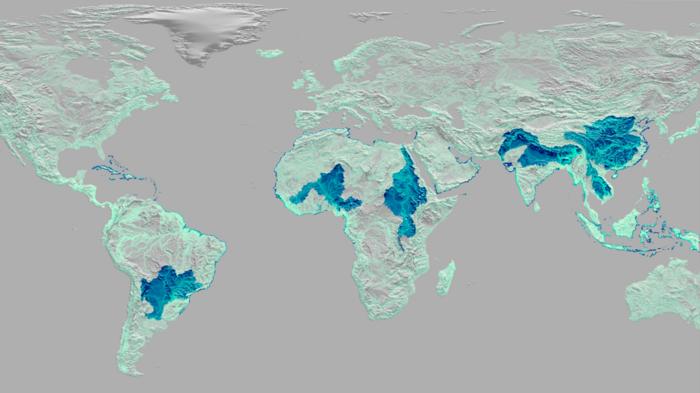Waste leakage to aquatic ecosystems is a major concern threatening biodiversity as well as human health. Inadequate disposal of waste, particularly plastic waste, has been documented in all the major ocean basins, beaches, rivers, lakes, and even in remote environments such as the Arctic and Antarctic. Previous studies have focused on estimating specifically plastic emissions into the oceans. However, no study has comprehensively assessed waste leakage into aquatic environments from a waste management perspective.

Credit: Adriana Gomez Sanabria
Waste leakage to aquatic ecosystems is a major concern threatening biodiversity as well as human health. Inadequate disposal of waste, particularly plastic waste, has been documented in all the major ocean basins, beaches, rivers, lakes, and even in remote environments such as the Arctic and Antarctic. Previous studies have focused on estimating specifically plastic emissions into the oceans. However, no study has comprehensively assessed waste leakage into aquatic environments from a waste management perspective.
IIASA researchers adopted a waste systems perspective to identify hotspots of land-waste leakage, and determined which rivers, lakes, and coastal areas are particularly at risk. The results indicate a need for urgent action.
“Our study shows that the majority of leakage of municipal solid waste – everyday items that are discarded by people – into aquatic environments occur in Africa, China, India, and South Asia. It’s necessary to start focusing on improving waste management systems in these affected areas,” explains study lead author Adriana Gomez Sanabria, a researcher in the Pollution Management Research Group of the IIASA Energy, Climate, and Environment Program.
The study highlights that focusing on single waste streams can lead to unintended consequences. For example, as single-use plastic cups are replaced with paper cups, the amount of paper waste has increased. Therefore, it is crucial to set targets that address multiple waste streams simultaneously. Additionally, the study emphasizes the importance of universal waste collection as the primary strategy to prevent waste leakage into terrestrial and aquatic environments, even in a scenario where overall waste generation is reduced.
“Our analysis shows that there is a pressing need to establish a standardized framework to monitor waste generation, composition, and flows. This framework should help us track the effectiveness of actions, including political, economic, and technological measures aimed at reducing waste and improving waste management systems,” notes Florian Lindl, a study coauthor and researcher in the IIASA Pollution Management Research Group.
The research team notes that their study addresses a crucial gap in our understanding of how waste management systems play an important role in addressing various environmental impacts. By examining the interaction between waste management and waste leakage, effective strategies can be identified to reduce pollution in aquatic environments and preserve ecosystems. This knowledge is vital for shaping policies and promoting sustainable development practices that minimize the environmental footprint of our consumption habits.
“We need to understand that the primary function of waste management systems is to protect human health and the environment. As creators of the waste crisis, we must take responsibility by changing our behavior to reduce consumption through refuse, rethink, and reuse practices,” concludes Gomez Sanabria.
Reference:
Gomez-Sanabria, A., Lindl, F. (2024) The crucial role of circular waste management systems in cutting waste leakage into aquatic environments. Nature Communications DOI: 10.1038/s41467-024-49555-9
IIASA researcher contact:
Adriana Gomez Sanabria
Research Scholar
Pollution Management Research Group
Energy, Climate, and Environment Program
[email protected]
Florian Lindl
Researcher
Pollution Management Research Group
Energy, Climate, and Environment Program
[email protected]
Press Officer
Bettina Greenwell
IIASA Press Office
Tel: +43 2236 807 282
[email protected]
About IIASA:
The International Institute for Applied Systems Analysis (IIASA) is an international scientific institute that conducts research into the critical issues of global environmental, economic, technological, and social change that we face in the twenty-first century. Our findings provide valuable options to policymakers to shape the future of our changing world. IIASA is independent and funded by prestigious research funding agencies in Africa, the Americas, Asia, and Europe.
Journal
Nature Communications
DOI
10.1038/s41467-024-49555-9
Article Title
The crucial role of circular waste management systems in cutting waste leakage into aquatic environments
Article Publication Date
27-Jun-2024




